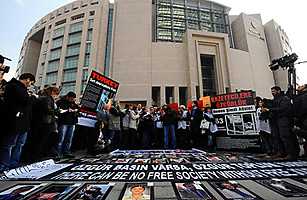By Pelin Turgut / Istanbul Thursday, Nov. 24, 2011

Journalists and human right activists protest in front of the courthouse in Istanbul during the trial of two prominent Turkish journalists Ahmet Sik and Nedim Sener on November 22, 2011.
Mustafa Ozer / AFP / Getty Images
Nine months after they were first detained, two well-known and internationally acclaimed Turkish investigative journalists finally appeared before a judge on Tuesday in a trial that has become a rallying point for critics of Turkey’s curbs on freedom of expression. Ahmet Sik and Nedim Sener are among 13 defendants, including editors of a hardline secularist website, accused of seeking to overthrow Prime Minister Recep Tayyip Erdogan’s Islamic-leaning government — charges that international observers say have little evidence to support them.
“The prosecutors had promised to produce hard evidence to justify [the journalists’] pre-trial detention. Where is it?,” said Johann Bihr, head of the Europe desk at Reporters Without Borders, outside the Istanbul courthouse. “Contrary to what was always claimed, the case against them is based on their work as journalists.” (See TIME International’s recent cover story on Erdogan.)
Held up as an example of secular democracy for the Middle East, Erdogan’s government is increasingly under fire for its treatment of journalists, pro-Kurdish advocates and opposition activists. There are more than 1,000 cases before the European Court of Human Rights concerning the Turkish government’s alleged quashing of freedom of expression, according to officials. “This situation has a chilling effect on journalism and journalists in Turkey,” said Thorbjorn Jagland, secretary-general of the Council of Europe.
European MEPs, journalists’ groups and rights advocates were among the dozens gathered on Tuesday outside Istanbul’s so-called Palace of Justice — a pale pink edifice of granite and glass that squats over the center of the city. Part mall, part hospital in appearance and with 326 courtrooms, it opened in August as — it is said — Europe’s largest courthouse. The irony was not lost on those gathered on Tuesday. “They’ll need all those hearing rooms if they keep on detaining people,” quipped one journalist. (See pictures of homelessness in Istanbul.)
Turkey aspires to become an E.U. member, yet its penal code is in urgent need of reform. There are currently 68 journalists in jail — more than in China, according to the International Press Institute. They are frequently detained under vague anti-terrorism legislation and then wait for months before seeing a judge. “We clearly have a situation which needs to be solved to help Turkey move forward,” said Jagland. In addition to Sener and Sik, the defendants in this most recent case include editors of Oda TV, a hardline secularist internet news portal critical of Erdogan.
I have known Ahmet Sik for many years — we worked together at Reuters. A passionate leftist who has spent his career working for human rights — and being harassed for that work — he is being accused of belonging to, of all things, a far-right nationalist network called Ergenekon that sought to stage a military coup and overthrow the government. (Read “Why Syria and Turkey Are Suddenly Far Apart on Arab Spring Protests.”)
Sik was arrested in March, shortly before he was due to publish a book called The Imam’s Army, an account of the allegedly increasing influence wielded by the Pennsylvania-based imam Fethullah Gulen among Turkey’s security forces. Gulen is an elderly Muslim preacher who has millions of followers in Turkey — depending on who you talk to, he is seen either as a moderate voice for tolerance or a secretive and sinister figure seeking to Islamicize the country. Police seized and banned The Imam’s Army but it was circulated on the internet and a group of intellectuals and journalists recently reissued it under a collective moniker as an act of civil disobedience.
Hundreds of people, including several former generals, are currently behind bars pending trial in Ergenekon-related proceedings. The glacial pace of Turkey’s judicial process means that it can take months before a hearing. On Tuesday, the judge rejected a request that the 13 defendants be released, and then adjourned until mid-December. Any requests made by lawyers could result in similar delays, possibly dragging the trial out for months. (Watch TIME’s video “Turkey’s Unconventional Muslim Minority.”)
Separately, hundreds of people — mostly pro-Kurdish activists — have been jailed in recent months on charges of belonging to the KCK, allegedly an offshoot of the separatist Kurdish PKK. In October, prominent publisher and free-speech activist Ragip Zarakolu and a well-known Istanbul-based political science professor were among those arrested, prompting criticism from Europe and the U.S. Erdogan has thus far shrugged off criticism of the detentions — but as his aspirations to international leadership grow, he may find such practices less and less tenable.
via Is Turkey Using the Courts to Silence Critics? – TIME.